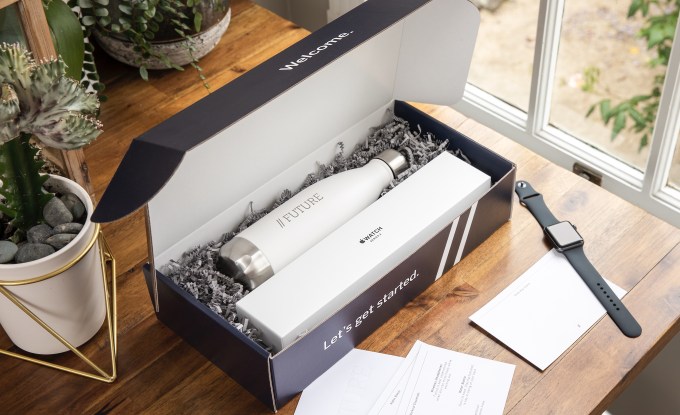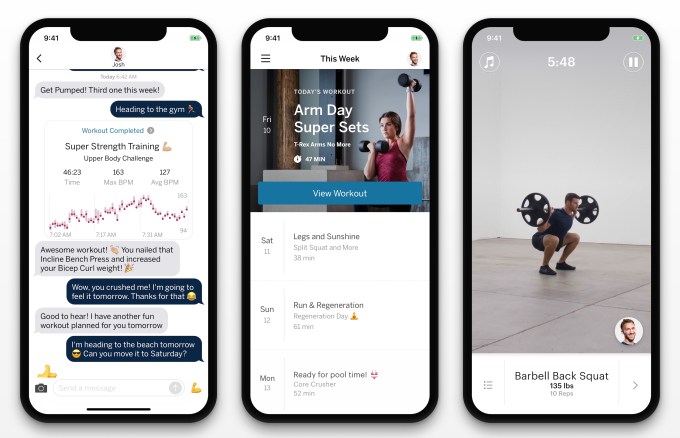Future launches $150/mo exercise app where real coaches nag you
The only way to beat laziness is with guilt, and so that’s what Future sells. It assigns you an actual human trainer who builds personalized workout plans and message you throughout the day to make sure you’re doing them. It even gives you an Apple Watch to track your activity and ensure you’re not lying. Future actually got me to the gym where my coach kicked my ass remotely with a 30 minute lifting routine I’d never have stuck to by myself.
The catch? It’s probably the most expensive app you’ve ever seen, charging $150 per month.
Future officially launches today, touting some stunning stats from its beta tests. 95% of users stuck with it for 3 months, and 85% kept training for 6 months. Luckily it comes with a 1-month money-back guarantee that CEO Rishi Mandal says has only been redeemed once.

The remarkable retention and Future’s potential to become a gateway for your fitness and nutrition spending have roped in some big name investors. Today it’s announcing an $8.5 million Series A led by Kleiner Perkins, building on its $3 million seed. Other backers include Instagram co-founder Mike Krieger, Khosla Ventures, Founders Fund, and Caffeinated Capital. Athletes are betting on Future’s promise of democratizing the personal training they get, including Golden State Warrior Sean Livingston, and NFL stars Ndamukong Suh and Kelvin Beachum.
“Future manages to be both deeply personalized (and personable!) while being super convenient” says Krieger of one of his first investments since leaving Instagram. Future’s Mandal previously built local experience app Sosh while sitting next to Krieger at incubator Dogpatch Labs where Instagram got its start. “The always available nature of it means travel or a shifting schedule is no longer an excuse to not work out.”
How Future Works (Out)
Throughout the onboarding, Future flexes the money you spend to give what feels like a luxury app experience.
Upon signup, you’ll answer some questions about your goals like slimming down or beefing up, and pick from a few expert trainers who specialize in your needs. You’ll do a 15-minute video chat with your trainer to get friendly, describe your schedule, and hammer out details of your workout plan. After you get your welcome kit with some swag and an Apple Watch, your trainer delivers your week’s worth of personalized daily routines that come with video instructions for each exercise. The Future app provides audio cues to guide you through the workout while your trainer chimes in with personalized pointers and motivation via pre-recorded voice clips.

But what’s unique about Future is that your trainer proactively checks in with you throughout your day to make sure you’re actually getting to the gym or doing those pushups. Since you don’t switch between trainers with each workout like some apps, and since they have your activity and heart rate data from the Apple Watch, they can spot patterns of procrastination or flaking out. And you’re prompted to give feedback after each sweat session that the trainer uses to tweak your plan. That personalization and prodding go a long way to making sure Future always fits your day and actually stays part of it.
For example, I wanted to burn a few pounds without burning too much time by adding a gym day or two plus some warmup strength training before my home Peloton rides. My trainer Renee, a former University Of Wisconsin Director of Sports Performance for basketball, designed a 30-minute weight lifting circuit and some 10-minute bodyweight exercise plans for me. When I messaged her that I was doing an a more intense spin class today, she remixed my warmup exercises to avoid legs so I wouldn’t be tired during my ride. So far she’s always responded within a few minutes, and been cheerful yet forceful “I know your days are slammed, just wanted to check in and see if you were able to get to that spin class?” she messaged me at 6:30pm. That’s something even most in-person trainers don’t do.

The constant communication and sense of trust users develop with their coaches could give Future potential beyond subscription fitness. The app becomes a hub for your healthy behavior. Future already offers an in-app Shop where it recommends workout clothes, headphones, and water bottles. It’s easy to imagine it partnering with fitness equipment makers, health food lines, or other brands to score a cut of referred sales.
Still, the biggest hurdle is convincing people to pay over 10X their Netflix fee for a personal trainer they don’t see in person. Compared to the $1 apps we’re used to, Future can induce sticker shock. But compared to unused gym memberships, pricey private coaching, and potential health problems, Future could look affordable if well-to-do professionals squint right. And if it works. Humans are sluggish. Most heathy habits lapse. But Future is building the closest thing to “press button, pay money, get fitter” — which in the end looks like getting someone to enthusiastically shame us from afar.
No comments: